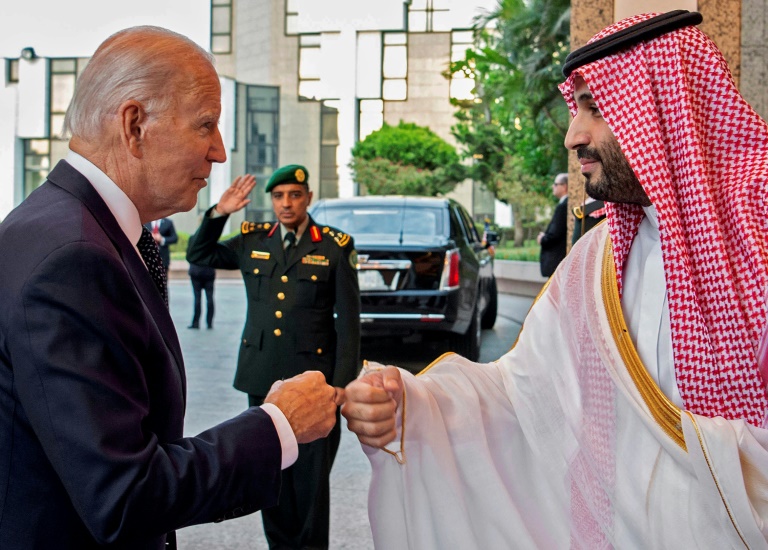Oil rift only latest ‘crack’ in time-worn US-Saudi bond

Saudi Crown Prince Mohammed bin Salman (R) bumps fists with US President Joe Biden at Al-Salam Palace in the Red Sea port of Jeddah on July 15, 2022
Riyadh – Saudi Arabia’s push for oil production cuts has placed new strain on its stormy relationship with the United States, though analysts say any predictions of an all-out break are premature.
The move last week by OPEC+ — composed of the Riyadh-led OPEC cartel and an additional group of 10 exporters headed by Russia — would reduce global output by up to two million barrels per day from November.
Coming amid an energy crisis triggered by the war in Ukraine, and as inflation-weary American voters prepare to cast ballots in midterm elections, the planned cuts have infuriated Washington, with US President Joe Biden warning Tuesday of unspecified “consequences”.
Saudi officials, for their part, have defended the move as purely motivated by economics, not politics, and dismissed charges from the White House that OPEC+ was “aligning with Russia”.
Verbal sparring between the two sides continued on Thursday, with the Saudi foreign ministry expressing “total rejection” of such claims “which are not based on facts”.
The ministry said it also rejected “any dictates, actions or efforts to distort its noble objectives to protect the global economy from oil market volatility”.
In response, the White House said Riyadh “can try to spin or deflect, but the facts are simple.”
Despite obvious rancour on both sides, it is unclear where the feud goes from here.
Biden stopped short of providing details on how he might respond in an interview with CNN on Tuesday, and Riyadh’s public statements continue to highlight the benefits of strong ties with Washington.
“The US-Saudi relationship has gone through periods of intense strain before, but in my view the current low point represents a crack but not a rupture,” said Anna Jacobs, senior analyst at the International Crisis Group (ICG).
“The reality is that the US and Saudi Arabia need each other.”
– Harsh words –
Just three months ago, Biden visited the Saudi city of Jeddah and greeted the de facto ruler, Crown Prince Mohammed bin Salman, with a fist-bump, drawing outrage from activists critical of the kingdom’s human rights record.
The trip represented a dramatic climb-down from Biden’s 2019 vow to turn Saudi Arabia into a “pariah” over abuses like the gruesome killing of journalist Jamal Khashoggi.
The fact that Biden’s trip did not lead to a hoped-for increase in oil production helps explain the harsh rhetoric from some members of his Democratic party, who have called the Saudis “royal backstabbers” who “misled and double-crossed” the US president.
Some US lawmakers have tried to revive support for a so-called NOPEC bill that would expose the oil cartel to antitrust lawsuits, while others have called for Washington to remove military assets from the kingdom.
Washington might find these steps counterproductive, however.
They “would threaten to break already fraught relations, which in turn would put even greater upward pressure on oil and fuel prices”, said Torbjorn Soltvedt of the risk intelligence company Verisk Maplecroft.
“The most likely response is what we have already seen — strongly worded statements from politicians,” said Ellen Wald, author of Saudi Inc., a history of energy giant Saudi Aramco.
– ‘Recalibration’ –
It is not just energy concerns bedevilling the US-Saudi partnership, which is often described as an oil-for-security arrangement.
Past disagreements have centred on the Israeli-Palestinian conflict and the nuclear deal with Iran pursued by former president Barack Obama.
The Saudis also objected to what they perceived as the tepid response from Biden’s predecessor, president Donald Trump, to attacks on Saudi oil facilities in 2019 claimed by Iran-backed Huthi rebels in Yemen.
“I think the US-Saudi relationship is going through a major recalibration,” said Jacobs of the ICG.
“The OPEC+ decision seems less about siding with Russia and more about Saudi Arabia acting in its own self-interest and pushing back against the traditional patron-client dynamic between the US and Saudi Arabia.”
While it remains a mystery what “consequences” Riyadh might face over the OPEC+ cuts, “an excessive response will only accelerate the ongoing effort to diversify Saudi’s military relations, not only with China and Russia but with France, the UK, India and Pakistan, and even Brazil and South Africa,” said Ali Shihabi, a Saudi analyst close to the government.
“You have to remember that the US never supplied Saudi with its absolute latest equipment anyway.”
That possibility aside, Saudi officials apparently remain optimistic that ties with Washington will weather the current turbulence.
“I don’t believe this relationship is broken,” Adel al-Jubeir, minister of state for foreign affairs, told CNN Wednesday.
“Far from it, this relationship is very robust.”
